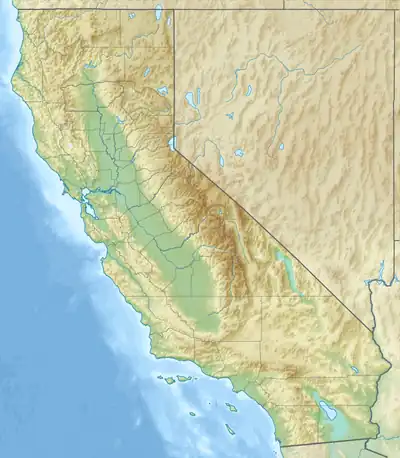 The San Jacinto post office after the quake | |
 Los Angeles San Diego | |
| UTC time | 1918-04-21 22:32:29 |
|---|---|
| ISC event | 913126 |
| USGS-ANSS | ComCat |
| Local date | April 21, 1918 |
| Local time | 14:32:29 |
| Magnitude | 6.7 Mw [1] |
| Depth | 10 km (6 mi) [1] |
| Epicenter | 33°45′00″N 116°53′00″W / 33.7500°N 116.8833°W [1] |
| Fault | San Jacinto Fault Zone |
| Total damage | $200,000 [2] |
| Max. intensity | IX (Violent)[3] |
| Casualties | 1 dead, several injured [4] |
The 1918 San Jacinto earthquake occurred in extreme eastern San Diego County in Southern California on April 21 at 14:32:29 local time. The shock had a moment magnitude of 6.7 and a maximum Mercalli intensity of IX (Violent). Several injuries and one death occurred with total losses estimated to be $200,000.
Tectonic setting
The San Jacinto Fault Zone is a major strike-slip fault zone that runs through San Bernardino, Riverside, San Diego, and Imperial counties in Southern California. The SJFZ is a component of the larger San Andreas transform system and is considered to be the most seismically active fault zone in the area. Together they relieve the majority of the stress between the Pacific and North American tectonic plates.
Damage
Many of the buildings in San Jacinto's business district were of poor construction, and all but one frame building and one concrete building collapsed, though high-quality structures did not experience serious damage. Minor damage to other buildings within 160 kilometers (99 mi) of San Jacinto also occurred. Roadways and irrigation canals also sustained damage and small sand blows were seen on a farm northwest of San Jacinto.[4]
The earthquake occurred on a Sunday afternoon when most of the businesses in San Jacinto were closed and void of customers. The business district had the greatest damage, though Hemet was also severely damaged. Damage to chimneys, windows, and plaster walls occurred to buildings and structures within 100 miles (160 km) of San Jacinto. Some of the damage that was inspected included landslides, partially collapsed buildings, and damaged irrigation canals and roads. Ground cracks were observed near the banks of the San Jacinto River.[5]
See also
References
- 1 2 3 ISC (2017), ISC-GEM Global Instrumental Earthquake Catalogue (1900–2013), Version 4.0, International Seismological Centre
- ↑ National Geophysical Data Center / World Data Service (NGDC/WDS) (1972), Significant Earthquake Database (Data Set), National Geophysical Data Center, NOAA, doi:10.7289/V5TD9V7K
- ↑ USGS (September 4, 2009), PAGER-CAT Earthquake Catalog, Version 2008_06.1, United States Geological Survey, archived from the original on 2020-03-13
- 1 2 Stover, C. W.; Coffman, J. L. (1993), Seismicity of the United States, 1568–1989 (Revised), U.S. Geological Survey professional paper 1527, United States Government Printing Office, pp. 76, 122
- ↑ Townley, S. D. (1918), "The San Jacinto earthquake of April 21, 1918", Bulletin of the Seismological Society of America, Seismological Society of America, VIII (2–3): 45–52, Bibcode:1918BuSSA...8...45T, doi:10.1785/BSSA0080020045, S2CID 133342475
Sources
- BSSA (1918), "Aftershocks of the San Jacinto earthquake of April 21, 1918", Bulletin of the Seismological Society of America, Seismological Society of America, 8 (4): 131–134, Bibcode:1918BuSSA...8..131., doi:10.1785/BSSA0080040131, S2CID 239177976
- Barrett Salisbury, J.; Rockwell, T. K.; Buga, M. T. (2017), "Paleoseismic Evidence for the 21 April 1918 Mw 6.9 Surface Rupture of the Northern Clark Strand of the Central San Jacinto Fault, California", Bulletin of the Seismological Society of America, 107 (1): 1027–1032, Bibcode:2017BuSSA.107.1027B, doi:10.1785/0120160026
External links
- Could a great quake strike on the enigmatic San Jacinto fault? – Temblor, Inc.
- The International Seismological Centre has a bibliography and/or authoritative data for this event.